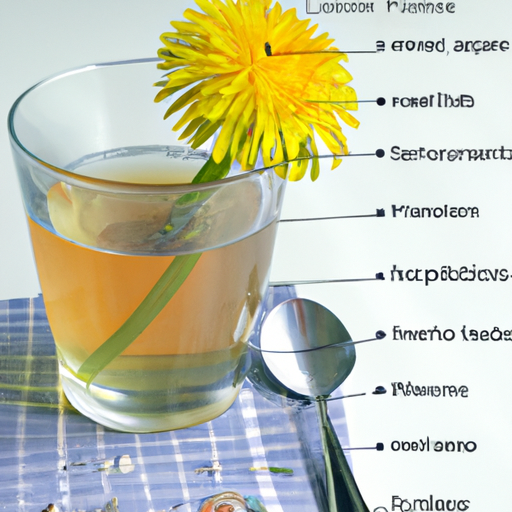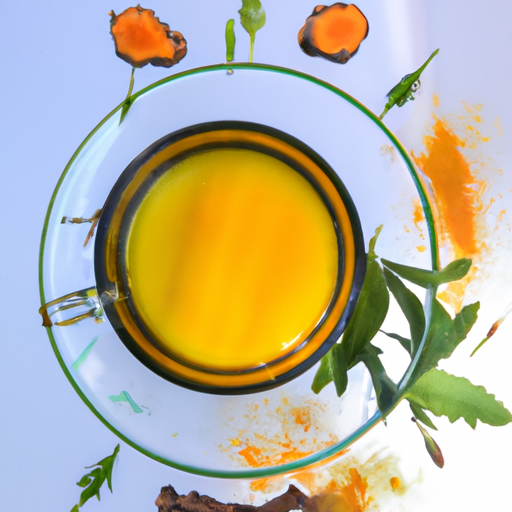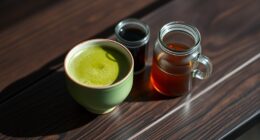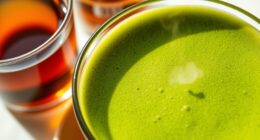Is turmeric good with tea? Absolutely!
Incorporating turmeric into your daily tea routine not only adds a vibrant color and exotic flavor to your cup, but it also delivers a wide range of health benefits.
Turmeric, a spice commonly used in Indian and Southeast Asian cuisines, contains a powerful compound called curcumin, known for its anti-inflammatory and antioxidant properties.
When combined with tea, turmeric can enhance the flavor profile and boost the overall nutritional value of your brew.
In this article, we will explore the numerous health benefits of turmeric in tea, provide tips on how to prepare turmeric-infused tea, suggest different tea and turmeric combinations, share delicious turmeric tea recipes, and answer some frequently asked questions about using turmeric in tea.
So grab your favorite mug and get ready to discover the wonderful world of turmeric tea!
Key Takeaways
- Turmeric can be incorporated into daily tea routine for added color, flavor, and health benefits.
- Turmeric contains curcumin, a powerful compound with anti-inflammatory and antioxidant properties, making it a beneficial addition to tea.
- Turmeric tea can support digestion, improve brain function, enhance immune system function, and potentially reduce the risk of chronic diseases.
- Turmeric latte, made with milk and spices, is a delicious and nutritious way to enjoy the benefits of turmeric in tea.
The Health Benefits of Turmeric in Tea
Including turmeric in your tea not only adds a warm and earthy flavor, but it also provides numerous health benefits that can boost your overall well-being. Turmeric, a vibrant yellow spice commonly used in Indian cuisine, has gained popularity for its potential health benefits. Research suggests that turmeric contains curcumin, a compound with powerful antioxidant and anti-inflammatory properties. These properties may help reduce the risk of chronic diseases, such as heart disease, diabetes, and certain types of cancer.
Additionally, turmeric has been known to support digestion, improve brain function, and enhance immune system function. One popular way to enjoy the health benefits of turmeric is by making a turmeric latte, which combines turmeric with milk and other spices for a delicious and nutritious beverage.
By incorporating turmeric into your daily tea routine, you can not only enhance the flavor but also reap the potential health benefits this spice has to offer.
Enhancing the Flavor of Your Tea with Turmeric
To truly elevate your tea experience, why not experiment with the delightful addition of a vibrant and aromatic spice? Turmeric, known for its numerous health benefits, can also enhance the flavor of your tea. Not only does it add a beautiful golden hue, but it also imparts a subtle earthy taste.
To help you appreciate the amazing combination of turmeric and tea, here is a table highlighting the benefits of turmeric latte and turmeric capsules:
| Turmeric Latte | Benefits of Turmeric Capsules |
|---|---|
| Creamy and frothy | Convenient and easy to consume |
| Contains warming spices | Standardized dosage of curcumin |
| Provides anti-inflammatory properties | Supports joint health |
| Can be enjoyed hot or cold | May aid digestion |
By incorporating turmeric into your tea, you can enjoy its unique flavor profile while reaping the potential health benefits. Now, let’s move on to how to prepare turmeric-infused tea seamlessly.
How to Prepare Turmeric-Infused Tea
Indulge in the art of preparing a sublime infusion by infusing your brew with the aromatic essence of vibrant and earthy turmeric. To create a delightful cup of turmeric-infused tea, follow these simple steps:
- Start by brewing your desired tea, such as black, green, or herbal.
- Add a pinch of ground turmeric to your teapot or cup.
- Pour the hot tea over the turmeric and let it steep for a few minutes to infuse the flavors.
This turmeric infusion not only adds a unique twist to your tea but also brings a range of health benefits. Turmeric contains curcumin, a powerful antioxidant that can promote healthy skin and reduce inflammation. Plus, if you’re looking for a comforting and nourishing beverage, you can try a turmeric latte recipe.
Now that you know how to prepare a turmeric-infused tea, let’s explore different tea and turmeric combinations to further enhance your brewing experience.
Exploring Different Tea and Turmeric Combinations
Discover the captivating flavors that emerge when you mix various types of tea with the vibrant essence of turmeric. One popular combination is the turmeric latte, which blends the warm, earthy taste of turmeric with the creamy richness of milk. This indulgent beverage isn’t just delicious but also offers potential health benefits, thanks to the anti-inflammatory properties of turmeric.
Another intriguing option is a turmeric and green tea blend. Green tea is known for its antioxidant properties, and when paired with turmeric, it creates a refreshing and invigorating drink. These combinations showcase the versatility of turmeric and its ability to enhance different types of tea.
Now that we’ve explored the different tea and turmeric combinations, let’s dive into some exciting turmeric tea recipes to try at home.
Turmeric Tea Recipes to Try at Home
Now, let’s delve into some tantalizing turmeric tea recipes you can whip up in the comfort of your own kitchen.
One popular variation is the turmeric latte, which combines the goodness of turmeric with warm milk and spices like cinnamon and ginger. This creamy and aromatic drink is not only delicious but also provides numerous health benefits.
Another interesting option is the turmeric and green tea blend. Green tea is known for its antioxidant properties, and when combined with turmeric, it creates a refreshing and soothing beverage. To make this blend, simply steep a green tea bag in hot water and add a pinch of turmeric powder. Stir well and enjoy the unique flavors.
Now, let’s move on to the next section for some tips on buying and storing turmeric for tea.
Tips for Buying and Storing Turmeric for Tea
To ensure you’ve got the freshest and most potent ingredients for your homemade turmeric tea, it’s important to know some tips for buying and storing this vibrant spice. Here are a few buying tips to keep in mind:
- Look for turmeric powder that’s got a bright golden-yellow color, as that indicates freshness.
- Check the label for organic and non-GMO certifications to make sure you’re getting a high-quality product.
- Consider buying whole turmeric root instead of powder for a more intense flavor and aroma.
When it comes to storing turmeric, follow these guidelines:
- Store it in an airtight container in a cool, dark place to maintain its potency.
- Keep it away from moisture to prevent clumping and spoilage.
- Avoid storing it near strong-smelling spices, as turmeric can easily absorb odors.
By following these buying and storage tips, you can make sure your turmeric tea is made with the best ingredients. Now, let’s move on to some frequently asked questions about turmeric in tea.
Frequently Asked Questions about Turmeric in Tea
One common question people have about incorporating turmeric into their daily routine is how much should be used in their favorite warm beverage. The recommended dosage of turmeric for tea is approximately 1/4 to 1/2 teaspoon per cup.
However, it’s important to note that everyone’s tolerance to turmeric may vary, so it’s best to start with a smaller amount and gradually increase as desired.
When consuming turmeric in tea, it’s crucial to be aware of potential side effects. While turmeric is generally considered safe for most people when used in moderation, some individuals may experience stomach upset, nausea, or diarrhea.
It’s also important to consult with a healthcare professional before incorporating turmeric into your routine, especially if you have any underlying health conditions or are taking medication, as turmeric may interact with certain drugs.
When adding turmeric to your tea, start with a small amount and gradually increase as desired, while being mindful of potential side effects and consulting with a healthcare professional if needed.
Frequently Asked Questions
Can turmeric tea help with weight loss?
Yes, turmeric tea can potentially help with weight loss due to its positive effects on metabolism. Studies suggest that the active compound in turmeric, called curcumin, may aid in weight management by reducing inflammation and increasing fat burning.
Is turmeric tea safe to consume during pregnancy?
Turmeric tea is generally safe to consume during pregnancy. It can help alleviate morning sickness and provide essential nutrients for prenatal health. However, it’s always best to consult with a healthcare professional before adding it to your routine.
Can turmeric tea help with reducing inflammation?
Yes, turmeric tea can help reduce inflammation. It contains curcumin, a compound with anti-inflammatory properties. To make turmeric tea, combine 1 tsp turmeric, 1 cup hot water, and optional ingredients like honey and lemon.
Does turmeric tea have any side effects?
Turmeric tea may have potential interactions with certain medications, so it’s important to consult with a healthcare professional. The recommended dosage for optimal health benefits is typically 1-2 cups per day.
Can turmeric tea improve digestion?
Yes, turmeric tea can enhance overall gut health and alleviate symptoms of indigestion. Studies show that turmeric’s active compound, curcumin, has anti-inflammatory properties that can improve digestion and relieve digestive issues.
Conclusion
In conclusion, incorporating turmeric into your tea can offer a multitude of health benefits, from its anti-inflammatory properties to its potential cancer-fighting abilities. Not only does turmeric enhance the flavor of your tea, but it also adds a vibrant yellow color that’s visually appealing.
By following simple recipes and exploring different tea and turmeric combinations, you can create delicious and nutritious turmeric-infused tea at home. Remember to buy high-quality turmeric and store it properly to ensure maximum freshness.
So why not give it a try and experience the wonders of turmeric in tea for yourself?










